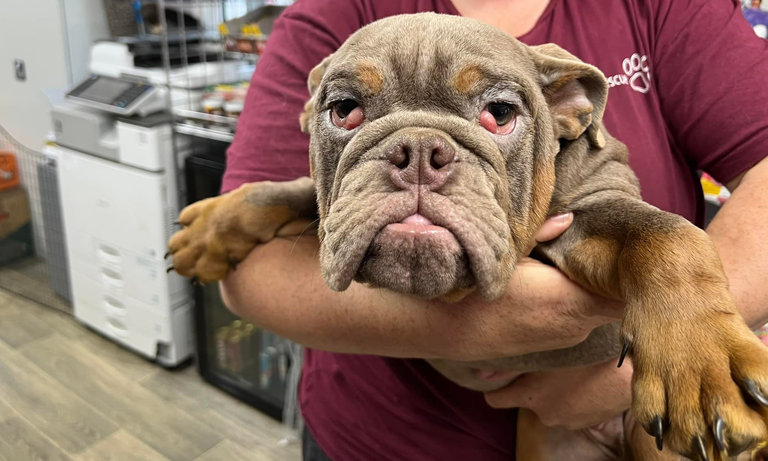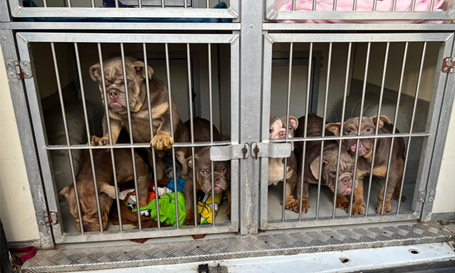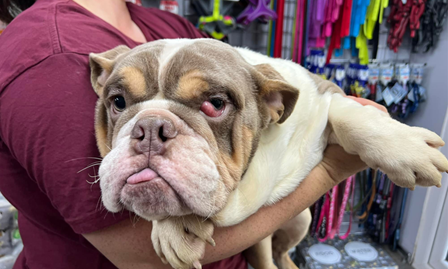Brucella canis: what vets need to know
14 Feb 2024
28 Dec 2022 | Vanessa Waddon | Ethics and Welfare | Animal Health
Vanessa Waddon, Senior Head of Operations at Hope Rescue, paints a stark picture of the ‘perfect storm’ of health and welfare crises for flat-faced dogs and other in-demand breeds.

At Hope Rescue, we are no strangers to taking in irresponsibly bred dogs. We work closely with Local Authorities in Wales to support them with dogs and puppies seized from illegal and low-welfare breeders. But even we were shocked following a seizure earlier this year from South Wales. As you may recall from media coverage at the time, we took in ten English bulldogs- two adults and eight six-to-12-month-old puppies.
As they came off the van one by one, our rescue-hardened animal welfare team took a sharp intake of breath. In 17 years of rescue, we had never seen so many health issues in one group of dogs. They came in with the usual breathing issues and many will need surgery to correct signs of brachycephalic obstructive airway syndrome (BOAS). However, it’s not just their flat faces that were a problem. Most had eye issues with cherry eye and entropion. They had skin issues due to excessive folds. A few of them had severe corkscrew tails to the point that they were inverted. Most worryingly, some had significant conformation issues with their legs, spines and hips, which required further investigation by vets. They also all came in with parvovirus, and one quickly developed a prolapse requiring surgery.
Working closely with our vets, fortunately, we managed to nurse them through the parvovirus and didn’t lose any. Sadly, their subsequent x-rays revealed a much bleaker picture. Merlin, my own foster pup, had severe elbow dysplasia and osteoarthritis in his stifle joints. The femoral head in his hips were not in the sockets and he had hemivertebrae. He would need extensive surgeries and even then, he would still be suffering from a lifetime of pain, so we took the heart-breaking decision to let him go whilst he was comfortable under anaesthetic. We were devastated when further investigations revealed that Jay was also suffering from similar deformities and once again, we had to make the difficult decision to euthanise him.

I cannot express adequately the emotional impact this has had on our team. Euthanising young dogs who should have happy, healthy lives ahead of them is as tough as it gets. It’s been heart-breaking to witness their suffering, much of which can be put down to poor breeding but also is due to inherent health issues within the breed. We’ve managed to rehome some of the bulldogs, but it hasn’t been easy as we know they will be life limited. Sadly, young Puffin has already been put to sleep due to the same health issues as Merlin and Jay.
Since these bulldogs, we have taken in another four groups of dogs from illegal and low-welfare breeders. This includes dachshunds, American bullies, shih tzus and poodles. It’s relentless. Our fear is that we are reaching a crisis point.
Due to the significant increase in dog ownership during the pandemic and the cost-of-living crisis in the past few months, we are seeing a huge spike in the number of brachycephalic dogs coming in from irresponsible breeders, owners who cannot afford their vet bills, or dogs who have been deliberately abandoned as strays.
We currently have eight English bulldogs and five French bulldogs in our care. Nearly all have health issues that the adopters will need to continue to manage and will be excluded from insurance. It’s a huge ask. We are seeing decreased adoption interest in these dogs as potential owners are put off by the very health issues we are highlighting to the wider public. It’s a perfect storm and we are in the midst of a welfare crisis for these breeds.

Like many animal welfare organisations, we continually bang the drum about brachycephalic breeds, encouraging prospective puppy owners to rescue or consider different breeds if purchasing. For those still wanting to purchase, we ask them to identify breeders who prioritise ‘health before wealth’, but they are few and far between compared to the volume of bulldog breeders who instead prioritise colour and exaggerated features. The public need to demand better, and we fully support the messaging of the Brachycephalic Working Group to ‘stop and think before buying a flat-faced dog’, following the latest research from the Royal Veterinary College.
Whatever the breed, it’s important to do due diligence to make sure you are getting a healthy and well-socialised puppy from a responsible source – and to advise prospective owners to do the same. It's frustrating to see so many poorly bred dogs continuing to come through our doors when there is so much excellent advice and support available to puppy buyers. The RSPCA in particular has a wealth of resources including choosing the right breed, tips for spotting bad breeders and finding a good breeder. The free Puppy Contract is also available to guide you through the process of buying a puppy responsibly. This includes:
Lastly, don’t forget to also consider adopting your new canine friend and check out your local rescue centre or breed rescues – you might just find your perfect match!
The images show English Bulldogs seized in South Wales from low-welfare breeders and taken in by Hope Rescue in June 2022.
Get tailored news in your inbox and online, plus access to our journals, resources and support services, join the BVA.
Join Us Today